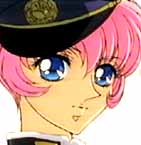
Synopsis
While wandering through Ohtori High School's lavish and peculiar garden of red roses, teenager Utena Tenjou comes across a single white rose. When she reaches out to pluck it, the flower transforms into a ring. She soon learns the glory and the burden of putting that ring on her finger.
The rose signet ring leads Utena into a secret circle of sword duelists who battle one another for the right to climb a mysterious staircase and battle in a mystical rose garden for the body and soul of a prized young nymph, Anthy the Rose Bride.
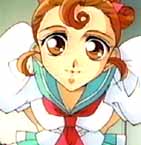
Stakes are high. They fight for sexual conquest - to unseat the reigning champion means to have the sensual and willing Anthy at beck, and in their bed. They fight to command their own reality - the final champion duelist stands to gain his or her heart's desire. But above all they fight for understanding.
Utena is first drawn into the battle in defense of the Rose Bride, fighting to save her from the other duelists who are desperate to use the power of the Rose Bride to realize their own personal utopias. Power hungry Saionji fights to own the Rose Bride outright, as a trophy. Juri, a beautiful lesbian, fights to gain glory and status. The lost Miki longs for a return to innocence, to go back to a happy time before he lost his purity to his own possessive sister.
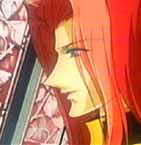
Unlike the others, though, Utena struggles to change the game, defying the traditional expectations of an adolescent girl in our world.
Review
The basic themes of "Utena" - that adolescent girls feel pressured to pigeonhole themselves into stereotypical, generally traditional roles, and that their pursuit of unrealistic romantic ideals runs them directly into walls of bitter, heart-shattering disappointment - do not present any shocking revelations. "Utena's" triumph is that it pulls off these easily hackneyed pubescent themes cleverly and poignantly. This success is achieved through layered, fascinatingly oblique storytelling, painstakingly faceted and balanced character relationships, and lets not forget lesbianism. Most of all, "Utena's" positively spectacular animation would make the film a joy to watch even if it were a silent picture.
Thematically, director Kunihiko Ikuhara illustrates various ways women deal with contradictions between their goals, society's expectations and reality. Though dressed up in the thin cloth of soap opera, behind the frills Ikuhara's characters' motives and methods for dealing with their problems are straightforward representations of his analysis of those conflicts. Juri reflects the jealously and conflict women generate amongst themselves. Anthy, in seeking security, supplicates herself to whoever is strongest at any given moment. Utena fights for a woman's right to stand up to tyranny and choose her own path. Almost all are bamboozled by the promise of a prince in shining armor who vows to rescue them gallantly from their dreary lives but, in the end, never shows up.
These metaphors are a quarter told and three-quarters shown in a breathtaking two-hour display of animated artistry. To do them justice with words would take a thousand for every frame. Ikuhara depicts scores of worthless princes, who fall far short of the women's idealized dream boats, as flies and locusts - they're emotionally bankrupt, silly, lying pretty boys and thoughtless emotional wrecks. And the empty cotton candy dreams that have delighted every little girl since she read her first fairy tale Ikuhara delivers as a castle in the clouds which turns into a colossal tank that tries to squash her.
Ikuhara plays with a wide array of techniques, exploring shape and color. At times his work utilizes sharp, slashing lines and shading to create a dramatic setting. For light-hearted moments he switches to the customary exaggerated look of comedic anime. He alternately uses abstract and detailed art masterfully to control focus and tone, such as in his tantalizing erotic scenes, which prove that attending the "less is more" school of sensuality has only informed Ikuhara's ability to tease and excite onscreen.
And Ikuhara has stuffed "Utena" with enough evocative, confounding symbolism to start scholars salivating, leaving the decided impression that every tiny detail has profound meaning behind it. But meaning aside, the flies buzzing around the fountain in the rose garden, the wedding bells clanging to begin and end each fight, the stakes which support the vines of roses shaped in the form of crucifixes, Utena pulling a sword from Anthy's bosom at the exact spot where Anthy's brother had stabbed her long ago, and each scene shaded with the color of blood and roses all infuse this film with a haunting, ineffable beauty.
A true visual feast that marks Ikuhara's mastery of the craft, "Utena's" story is well told, but it's imagery is the truly unforgettable aspect of this film. Currently in distribution negotiations, look for "Utena" to hit U.S. shores sometime in the near future.
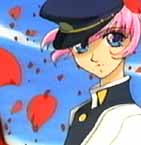
Ratings
Overall: 9.0
Strikes resonant feminine chords in bemoaning the unrealistic expectations of young girls' hearts, but doesn't insult its male audience by waxing maudlin or saccharine. Melodramatic at times, but makes up for it with lots of hot lezbo action. Incredible animation puts this one over the top.
Story: 8.0
The complexity with which director Kunihiko Ikuhara renders his fictional world and the character interactions within it confounds, but the plot manages to stay intriguing. The overall emotional progression of the story becomes clear by the end.
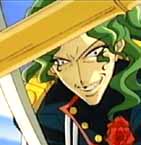
Character Development: 8.0
"Utena" uses characters as lenses through which to analyze various adolescent romantic ideals. Characters' arcs are strictly subordinate to this primary purpose, and therefore only a few main characters, such as Utena and Anthy, undergo much change. Nevertheless, even incidental characters are, from the start, well fleshed out as Ikuhara has had plenty of time to develop them in his series of the same name.
Art/Animation: 10
Creative character design concepts. Masterful scenery work. Stunning, evocative use of several interpretive styles of animation. No joke: an amazing visual experience. I don't give out tens.
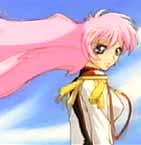
Translation: ?
The movie is still in progress and, having only seen it in the cinema once, commenting on the translation would be unfair.
Acting: 8.0
Despite the language barrier, the inflections of the actors' deliveries added to the pathos of the scenes. The subtitles filled in meaning nicely.
MPAA Equivalent: PG-13
Mild violence, mild nudity, very adult situations.
X-Factors
Testosterone Deficiency Factor: 9.0
Wispy, long haired, big eyed, tantrum throwing bishounen would be unidentifiable as male were it not for their campy voices.
Turbo Teen Factor: 8.0
These chicks can turn into cars!
Brassy Dame Factor: 8.0
When a green-haired fruitcake named Saionji brandishes a katana and challenges her to a duel, Utena picks up a piece of bamboo and says, "This will do."
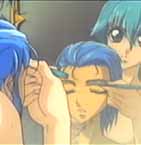
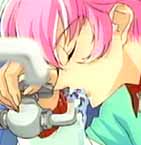
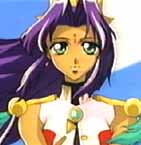
Information
Title: The Adolescence of Utena
Type: Movie
Format: DVD
Genre: Mahou Shoujo (Magical Girl)
Original Concept: Chiho Saito
Character Designer: Shinya Hasegawa
Japanese Producer: Tetsuo Katayama
Director: Kunihiko Ikuhara
Music Composer: J.A. Seazer



